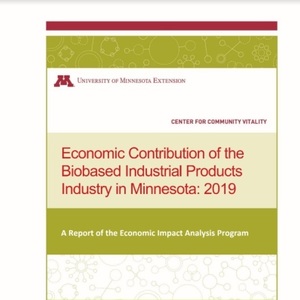Report quantifies impact of the Minnesota Bioincentive Program

September 2, 2020
BY Erin Krueger
The Bioeconomy Coalition of Minnesota has released the results of a new analysis that shows Minnesota’s Bioincentive Program is working to generate significant economic and job benefits for the state’s biobased industrial product companies.
The Minnesota Bioincentive Program was enacted during the 2015 legislative season and aims to support the growth and development of the state’s bioeconomy. Funding for the program comes from the Agricultural Growth, Research and Innovation program appropriation. As of January 2020, funding was for $2.5 million each year of the biennium.
Companies receiving the incentive must use biomass from agricultural or forestry sources, or the organic portion of solid waste. They must also source 80 percent of that feedstock from Minnesota and follow standards for harvesting. Eligible companies must also meet quarterly minimum production levels and begin producing biofuels, renewable chemicals or biomass thermal energy before June 30, 2025.
A new report prepared by the University of Minnesota Extension’s Center for Community Vitality and the Great Plains Institute, determined the Bioincentive Program contributed to $1.2 billion of economic activity through construction and $601.7 million from operations, including employment for more than 8,300 Minnesotans.
Advertisement
“This new analysis shows that the Bioincentive Program is working to make Minnesota an attractive place for the industry to invest and those investments have an incredible multiplier effect on the economy and jobs base,” said Brendan Jordan, vice president of transportation and fuels at the Great Plains Institute. “The multibillion-dollar economic impact is at risk because the incentive is being underfunded in the Minnesota Legislature. Companies are making investments based on the incentive formula written into state statute, but that could end if the state does not live up to its commitment. In this uncertain time, we need to make sure that we invest in what works to preserve jobs and stabilize the economy for what lies ahead.”
The report explains that biobased companies transform a feedstock, such as grain, oilseeds, energy crops, crop residuals, wood, or municipal organic waste, into a product, such as biofuels, renewable chemicals or heat.
To complete the report, data was gathered from biobased product companies within Minnesota that currently, or plan to, receive support from the Minnesota Bioincentive Program. The authors of the report note that 10 of the 12 businesses currently operating responded to the data request. Researchers then extrapolated the data to account for the two remaining businesses.
The result of the analysis shows that Minnesota’s biobased industrial product companies that received the incentive directly spent $690.5 million on construction projects to retrofit or expand their facilities. As a result, Minnesota’s biobased industrial companies generated an estimated $1.2 billion of economic activity in the state, including $540.6 million in labor income. They are supported 8,325 workers. In addition, construction generated an estimated $46.5 million in tax collections, according to the report. The top industries affected by the construction activities were wholesale trade, housing and real estate.
Advertisement
The study also showed that Minnesota’s biobased industrial product companies spent $438.8 million to operate in 2019. Major expenditures included feedstock and labor. The companies included in the analysis utilized corn grain, corn kernel fiber or wood as their primary feedstock.
Operations of the biobased industrial product companies generated $610.7 million of economic activity, including $127 million of labor income. They also supported 2,415 works and generated an estimated $13.3 million in tax collections. Top industries affected by operations of those companies included wholesale trade, housing and real estate.
Overall, the study determined that the companies claiming the Minnesota Bioincentive received $1.5 million in incentives last year. For every tax dollar invested in the incentives, $407.10 was generated in the economy and $8.90 was collected in taxes.
A full copy of the report can be downloaded from the U of M website.
Related Stories
CountryMark on July 22 celebrated the completion of more than $100 million in upgrades at its refinery in Indiana, including those related to soybean oil storage. The facility produces renewable diesel via coprocessing technology.
ATOBA Energy and Air Moana are partnering to implement scalable solutions for the supply of SAF. The collaboration aims to ensure long-term SAF availability while supporting local initiatives to develop sustainable fuel production in Tahiti.
While final IRS guidance is still pending, the foundation of the 45Z program is well defined. Clean fuel producers should no longer be waiting; they can now move forward with critical planning and preparation, according to EcoEngineers.
Neste Corp. on July 24 released second quarter results, reporting record quarterly renewable product sales volumes despite weaker margins. SAF sales were up nearly 80% when compared to the first quarter of 2025.
Valero Energy Corp. on July 24 released second quarter results, reporting a profitable three-month period for its ethanol segment. The renewable diesel segment posted a loss, but the company’s new sustainable aviation fuel (SAF) unit operated well.
Upcoming Events










